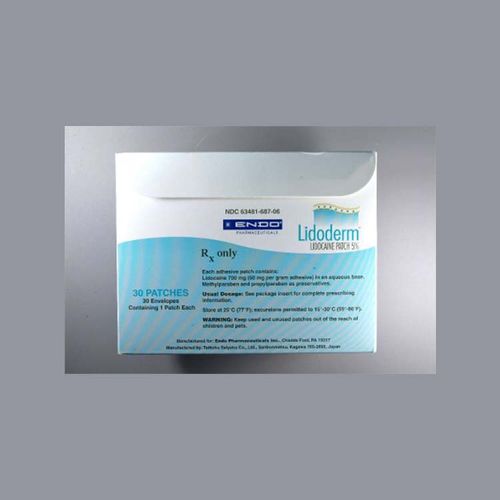A medicated patch placed on the knee may ease osteoarthritis pain nearly as well as potentially risky Cox-2 drugs, suggests a new study.
In the study, patients treated with Lidoderm, a transdermal patch containing 5% lidocaine, reported similar levels of pain relief as those taking celecoxib (Celebrex).
The Study
A total of 143 patients who had osteoarthritis of one or both knees were enrolled in the study before it was voluntarily halted because of concerns about the safety of Cox-2 inhibitors. Consequently, the results are preliminary.
Before the study was halted, patients received either lidocaine patches or 200 milligrams (mg) of celecoxib.
After six weeks of treatment, 54% of the lidocaine patients and 62% of the celecoxib patients experienced at least a 30% improvement in pain intensity.
"This is what we call clinically meaningful," says study co-author Dr. Alan Kivitz, founder of the Altoona Center for Clinical Research in Duncansville, Pennsylvania.
Kivitz and his colleagues were not seeking a Cox-2 alternative when they started the study. They merely speculated that Lidoderm, approved by the US Food and Drug Administration (FDA) in 1999 for the treatment of postherpetic neuralgia, a painful complication of shingles, would provide the same pain relief when applied to arthritic joints.
"With all of the concern about Cox-2 inhibitors, the study took on new potential meaning," he says.
"The most important thing is to have [treatment] options available, " Kivitz says.
A Viable Alternative
As with any FDA-approved medication, physicians can prescribe the lidocaine patch for osteoarthritis of the knee. It would be considered an "off-label" use, since the therapy is not approved for that purpose.
And while further research is needed to bear out the safety and effectiveness this approach, Kivitz says the findings should give patients hope that other pain-relief options are being explored.
Questions about the Cox-2 class of painkillers began to surface after Merck & Co. pulled its arthritis drug Vioxx from the market in September 2004, on data suggesting a link to heart attack and stroke risk.
Despite a federal advisory panel's recommendation to keep Cox-2 inhibitors on the market, saying their benefits outweigh their risks, FDA officials did not agree, and recommended Bextra, another Cox-2 drug, be pulled in April 2005. Vioxx has not been brought back.
A jury recently ruled in favor of the widow of a 59-year-old man who died suddenly after taking Vioxx for eight months. The family claims Vioxx contributed to his death. This ruling is the first of more than 4,000 Vioxx-related lawsuits already filed.
Ginger Works as well as Aspirin
In a recent study, participants who took two I 500-milligram (mg) tablets of gingerol, the component that gives ginger its bite, twice a day for three months experienced the same reduction in inflammation as when they took aspirin for three months.
Caution: Ginger can thin blood, so consult your doctor.
Pine Tree Bark May Fight Arthritis Pain
Finnish researchers report that a group of anti-inflammatory compounds called phenolics that are found in the bark of Scotch pine may be effective in fighting arthritis and pain. And these compounds are probably in the bark of other species of pine trees as well, the scientists say.
Early laboratory tests were done on cells, so more research is needed to determine how much of this extract might be required to be effective, how it could be taken and whether it could cause harmful side effects.
Pine bark extract is a folk remedy that has been used by people throughout the world to treat various health problems, from wounds to coughs. Recent research suggests that pine bark extract may have the potential to help treat high blood pressure, asthma, heart disease and skin cancer.
